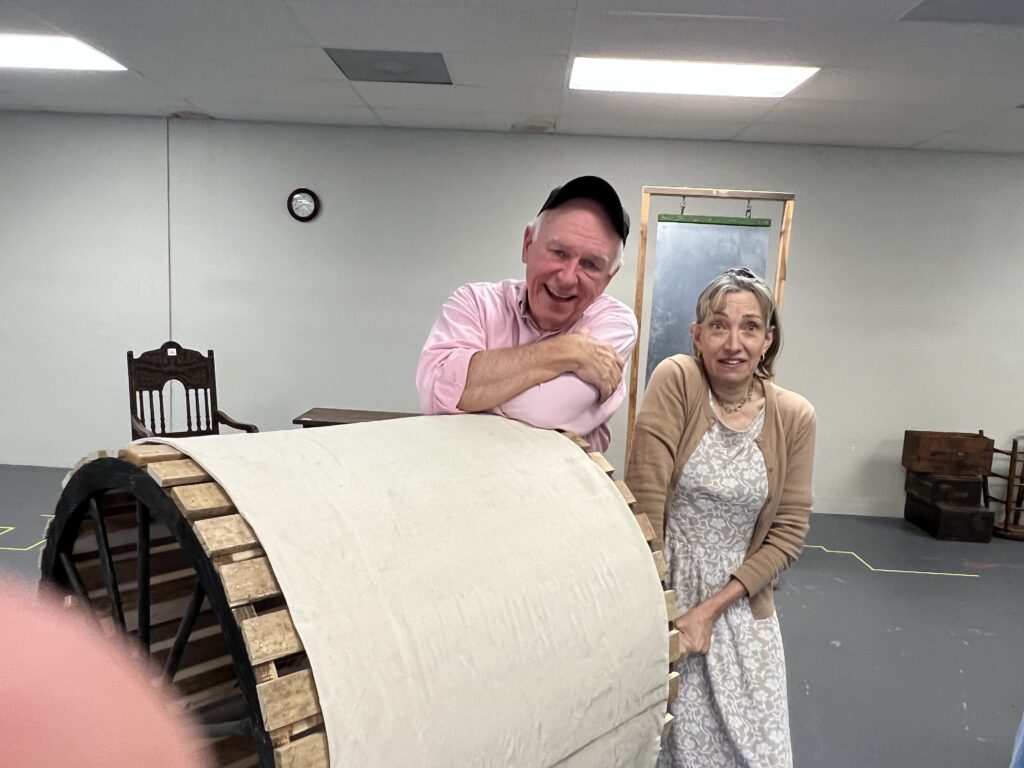30 years ago I was in a play called The Madness of George III. We toured to the USA and played four venues over 13 weeks.

I was cast as Sir Nigel Hawthorne’s understudy and also had a small part in the show. It was somewhat unthinkable that had Nigel been off, the powers that be would have allowed me to go on, seeing as Nigel (who later played the role in the film, which on Nigel’s suggestion was renamed The Madness of King George so as to avoid any hint of sequels or pequels) was the draw. Well perhaps not exclusively. It was a Royal National Theatre production out of London after all, and Alan Bennet was the playwright. So there were those glamours at work as well.

I watched Nigel’s work closely as I was paid to do, and came to the conclusion that he touched greatness in the role. By which I mean there were moments in the performance of exquisite, heartbreaking delicacy. In a whole year with the company in the UK, in Greece, in Israel and in the USA I never once saw Nigel working at anything less than full force. And I don’t mean just in performance. If a detail needed to be reworked or if somebody had to step in because one of the other actors had come down with food poisoning (that happened), at the put-in rehearsal Nigel was there always giving it 100%.
At the time he was a man in his late 60s, the age I am now. His squash playing days were over because being one who goes for everything, and having reached the time of life when there were issues with his internal organs, he knew it was no longer safe to rampage around a squash court. He saved all that for the stage.
Nigel by temperament was the nearest thing I have ever encountered in my 40 plus years as an actor to the character of ‘Sir’ in The Dresser.
By which I mean: he was a hugely talented actor with a special genius for light comedy; George III was, similarly to ‘Sir’, a Lear-adjacent role; in George III Nigel was tasked with very heavy acting lifting; he had a desperate personal agenda (having twice before been passed over for the film version of roles which he had originated on stage); in offstage interaction with other actors he could by turns be warm, acerbic, demanding, critical, supportive and furious. Over the year that I worked with him my affection grew slowly, but now that I understand something of what he was up against, I would say my respect and gratitude and admiration for him is total.

Because just now I happen to be playing ‘Sir’ in The Dresser by Ronald Harwood and we opened to an enthusiastic audience on the eve of the winter solstice.

There is no way round it, ‘Sir’ is a demanding role. Apart from the vocal variety required and the physical exuberance alternating with strange turns of mind, there is live make-up, costuming and facial hair to be reckoned with. Fortunately it is not a long show, coming in at just about 2 hours including an interval. The two-show days we are required to do are distantly reminiscent of a time long ago when I was touring Toad of Toad Hall and we had to give three performances in one day. I don’t recommend it.

The other blessing is an agile and talented supporting cast. The splendid slender Denise Cormier as Her Ladyship

The splendid petite Kelly Gibson (impressive on timpani)

I give the bodily adjectives because the action of the play requires me to lift each of these actresses (separately not simultaneously) in my arms.
The lovely Beth Dimon ⎯ we’ve worked together three times before and I regard her as one of my stage sisters and as I told her the other day, I knew she was a wonderful actress the first moment I saw her on stage back in 2003.

Then there are the lads. Dennis Creaghan has a single scene of comedy gold in this show. If the audience is savvy enough to get the joke they come out humming it. David Hyland makes a fish dip of the quality that makes you exclaim “There’s money to be made here”. Likewise Cliff Goulet makes a telling backstage cameo as a master baker, Gary Cadwallader supplies dramaturgy and an excellently sinister Oxenby, John Campagnuolo gives us a burly knight (the only one of an intended hundred in this depleted troupe).

And I must make special mention of Bill Hayes. Bill is the producing artistic director of Palm Beach Dramaworks. He played ‘Norman’ in this play 21 years ago (I saw that production in which the late marvelous Hal Johnstone played ‘Sir’) and Bill is now reprising the role for the theatre’s 25th anniversary. The play requires a double act between us and it has been a delight to work closely together, notwithstanding the existential conspiracy of props, hairpieces and costume which seem to fight back from time to time, on this marvelous play which is a love letter to the backstage life of the British theatre of 80 years ago.

I also take time to say kudos to J. Barry Lewis. We have worked together many times. He is an inventive and detailed director, never more so than on this one! He has corralled the actors designers and technicians to create an (though I say it myself) excellent production of The Dresser.

Come and see it! Tickets here.
And while I’m handing out roses. Thanks to Palm Beach Dramaworks in general and all who sail in her ⎯ too many people doing a great job to name here, but they know who they are. Suffice to say this production is stage managed with her usual quiet precise efficiency by Suzanne Clement Jones ⎯ and doesn’t it help when someone knows what they are doing!?

It is remarkable and fabulous to have seen this company develop. When they took residence in Clematis Street, West Palm Beach, the place was full of vacant retail units. Now it is hopping. Restaurants jostle yoga studios, and the street lighting is reminiscent of a Pina colada gone wild.

3 replies on “Sir”
If it wasn’t for the ocean, I’d be there in a flash. I know you’ll be wonderful, it’s an absolute gem of a role, for which you are perfect. Have a good run.
Oh my brother, you are the joy!
I would so love to see this production. I’m sure it is a splendid night at the theatre. Collin is a dear friend a wonderful actor and a capable painter and decorator. Have fun everyone and knock em dead.